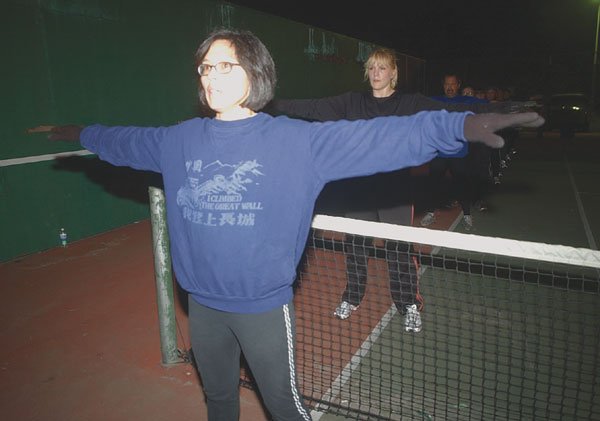Gilroy
– Rosemary Kamei probably does sit still every now and then, but
it’s hard to imagine when.
She works full time, sits on the board of directors for the
Santa Clara Valley Water District, leads Asians For a Better
Community, raises money for her son’s cross-country team at Live
Oak High School, draws and wakes before dawn three times a week to
attend
”
boot camp.
”
Gilroy – Rosemary Kamei probably does sit still every now and then, but it’s hard to imagine when.
She works full time, sits on the board of directors for the Santa Clara Valley Water District, leads Asians For a Better Community, raises money for her son’s cross-country team at Live Oak High School, draws and wakes before dawn three times a week to attend “boot camp.” And just when you think you can let out your breath, consider she also belongs to a book club, and because she just finished her master’s degree in urban and regional planning and has “a little more time,” she’s taken up the saxophone.
“I don’t know how to relax,” Kamei said recently. “I’d like to. I’m learning how. I do all these things because I want to, but one of these days I’ll say no.”
She’s lucky, then, that her job at Planned Parenthood in San Jose offers her so much flexibility. Kamei has been a fundraiser there for four years. She said a big part of her job is to educate people about what Planned Parenthood does.
“People see Planned Parenthood and think ‘abortion,'” she said. “But that’s only about 3 percent of what we do. We provide comprehensive medical services to a community that otherwise couldn’t get them.”
Flexibility is important for Kamei, especially now, when it’s budget time at the water district and being a board member turns into another full-time job.
“I don’t know how anybody fits the things she does into a schedule,” water district CEO Stan Williams said of Kamei. “She can be tough to work with because she’s so busy. We always have to figure out ways to get her information she needs and it can be tough to stay in contact with her.”
Kamei was appointed to the board in 1993 to represent South County, and re-elected the following year. She’s now halfway through her third full term, the only woman on a board that, superficially at least, has always been a boy’s club. Kamei is just the third woman to sit on the board, and the first since Audrey Fisher, who served from 1982 to 1986. Linda Peralta was on the board from 1976 to 1982.
“I think she’s a good professional role model for women,” Williams said. “She has the ability to see the big picture and the details. Rosemary asks the hardest questions of any of the board members, and the quality of the questions she asks has more influence on the board than the fact she’s a woman.”
Kamei said that the board has changed dramatically since 1993. The board she joined was insulated, limited itself to its traditional functions of water supply and flood control, and shied away from change.
“The board was not looking at things comprehensively,” she said. “But the board has changed its approach. We’ve had to step back and ask how the things we do fit into the context of the community. We’ve become more like stewards, more sensitive to the environment. When I first joined, you couldn’t say ‘environmental enhancement’ or ‘restoration’ because that would cause anxiety among some former board members.”
“When Rosemary joined the board, our staff had to learn a different way of doing business,” Williams said. “Right from the start she took very seriously that she was supposed to be in contact with her constituents. She demanded that she be given a meaningful role with the people in her area.”
Born in New York
Kamei was born in Spanish Harlem in 1959. She left New York for the University of Wisconsin to major in political science and then came to California the old-fashioned way: She hopped on a U-Haul with two friends from New York and brought her entire life to Berkeley in one suitcase. It wasn’t long before she was broke, so Kamei called her mother for help.
“I ran out of money and called my mom,” Kamei said, “but my mom told me she couldn’t help me. I was ready to go to San Antonio because my sister was there.”
Kamei grew up speaking Spanish so she was able to land a job at a law firm that needed a bi-lingual receptionist. She went to night school to learn how to type so she could handle the work. When she got hitched in 1983, she married into her husband’s family nursery in Morgan Hill. Before long, she was managing Kamei Nursery. They have since divorced.
“It was my first time living in a rural environment, but I had taken horticulture and botany courses in college,” she said of taking over for an under-performing manager. “I thought, ‘how hard can it be?'”
Very hard, as it turned out. As the 1980s unfolded, and Kamei was raising two children and on-call around the clock, the nursery struggled to compete in an increasingly hostile flower market.
“I really miss it, but it’s a difficult and challenging way to make a living,” Kamei said. “The competition isn’t just local. It’s statewide. It’s international. When the market is flooded with flowers you can’t even recoup your costs. When people talk to me about how hard it is to be a farmer, I understand.”
It was at the nursery that Kamei first got involved with the water district, which tried to help farmers and growers survive the drought that parched the Santa Clara Valley in the late ’80s and early ’90s. The nursery tried to conserve water by growing more native and drought-resistant plants, but the less colorful flora weren’t a success.
So in 1992, Kamei started public sector hopping. She spent a year on the civil grand jury, and then answered an ad for the Morgan Hill planning commission.
“I remember Morgan Hill when it had a lot more orchards, a lot more vineyards, a lot more farming. I always realized that growth here is really important. Planning plays a very important role in the community,” she said. “I was selected for one of the vacancies, but I was very naive politically. I thought it would be exciting. I didn’t know I would be sitting in meetings until midnight.”
A taste for politics
Late nights notwithstanding, Kamei had developed a taste for planning – and for politics. She was elected to the water board in 1994, and in 1997, she ran in the special election to replace Mike Honda on the county board of supervisors. She survived the primary, but lost to Don Gage in a runoff, and lost her political innocence along the way.
“I got a lot of strange mail,” Kamei said of that campaign. Some of the mail was threatening, most of it drew attention to either her gender or Chinese heritage.
“A lot of things I didn’t think would happen, happened,” she said. “I learned a lot of lessons about running for a higher-profile office.”
Kamei said she will run again for the water board in 2006, and now that she has a new degree in planning, has begun thinking about what she wants to do in the next phase of her life.
“I love my job at Planned Parenthood, but I really enjoy land use and the planning process, and I want to figure out how I can do that for the community,” she said.
Ideally, Kamei wants to find a way to marry land use planning, which is under the jurisdiction of cities and counties, to the district’s control of water resources. That’s the goal of the Water Resources Protection Collaborative, which Kamei had a hand in developing in 2002.
The aim of the collaborative is to help cities better account for water resources in their planning. Gilroy is participating in a pilot program testing the efficacy of bringing the district in early in the planning process, rather than later when retooling and redesign might cost delays and a lot of money.
“In the end I hope the collaborative is a way of doing business with cities so we can both benefit and resources will be enhanced,” Kamei said. She’s trying to organize a South County water summit to look at the future of the water supply south of San Jose.
“I wish people would be more interested in what we do,” she said. “Take an interest in their watershed, be more involved. The general public expects that when they turn on the tap that the water will be there and be good quality. They don’t look at the bigger picture. One of my hopes for our educational outreach is to get them to understand where their water comes from.”
She also wants to go to work for a county planning agency. To avoid a conflict of interest with the water district, Kamei is pondering looking for work in Santa Cruz or Monterey counties, but she has a lot to extricate herself from in Morgan Hill.
Kamei is one of the founders of Asians for a Better Community, which will host its second Chinese New Year celebration next Saturday at the Morgan Hill Community Center. The society has also established a Chinese school at the Learning and Loving Center. The school offers math classes for children and Friday night classes in elementary Chinese for kids and Chinese as a second language for adults. Kamei is one of the students. She hopes the school will offer tai chi classes next summer.
If that’s not enough, Kamei is organizing a wine auction to benefit the athletic departments at several Morgan Hill high schools. Once a week, she gets a saxophone lesson at the Music Tree. All the time, she’s plotting her next move, describing it with the diplomacy of a politician.
“I would love to run for higher office, but conditions would have to be just right,” she said. “I’m familiar with the area, and I have a lot to offer, but I’m not in a rush. I think of everything I do as being interrelated. I don’t ever think of myself as having one single purpose.”















